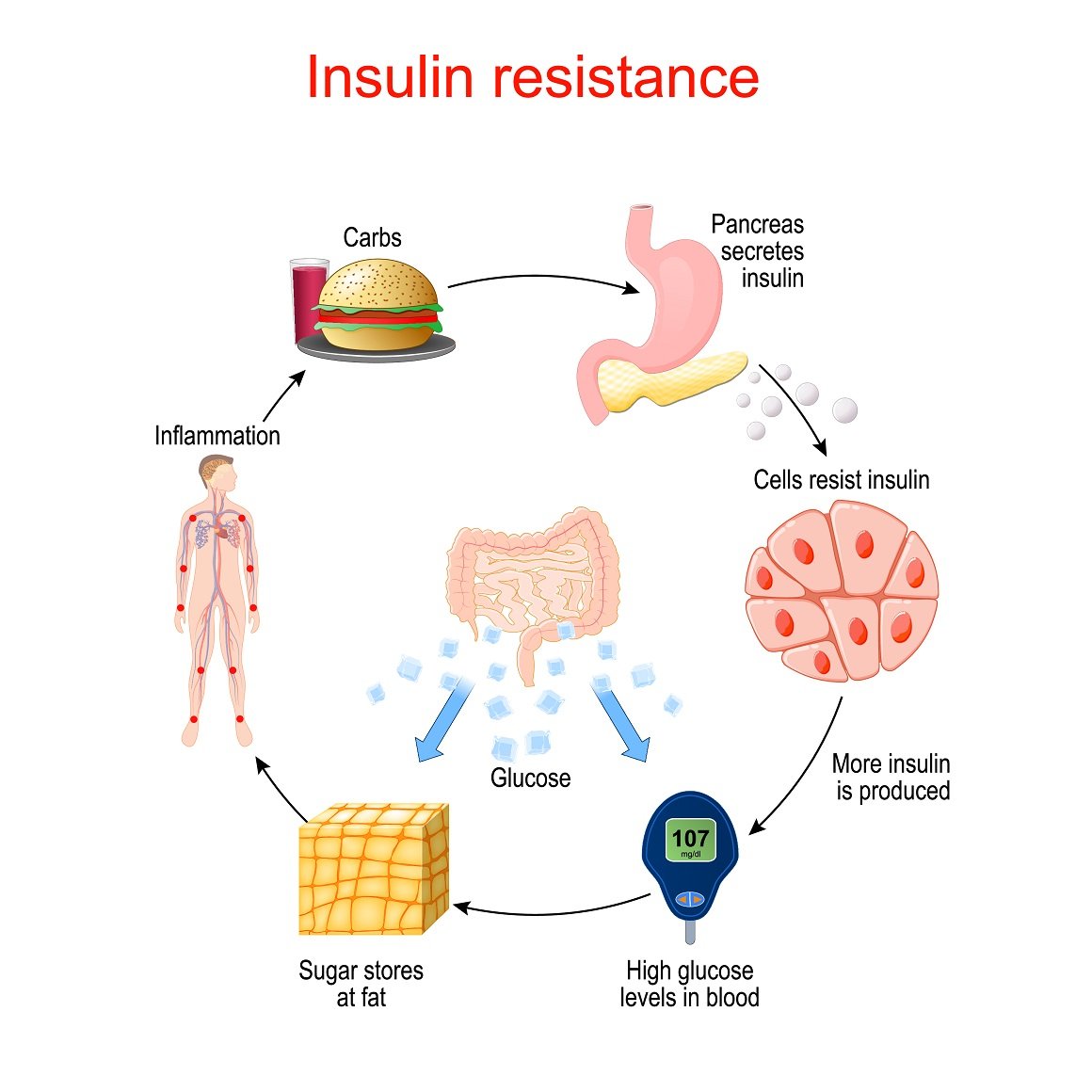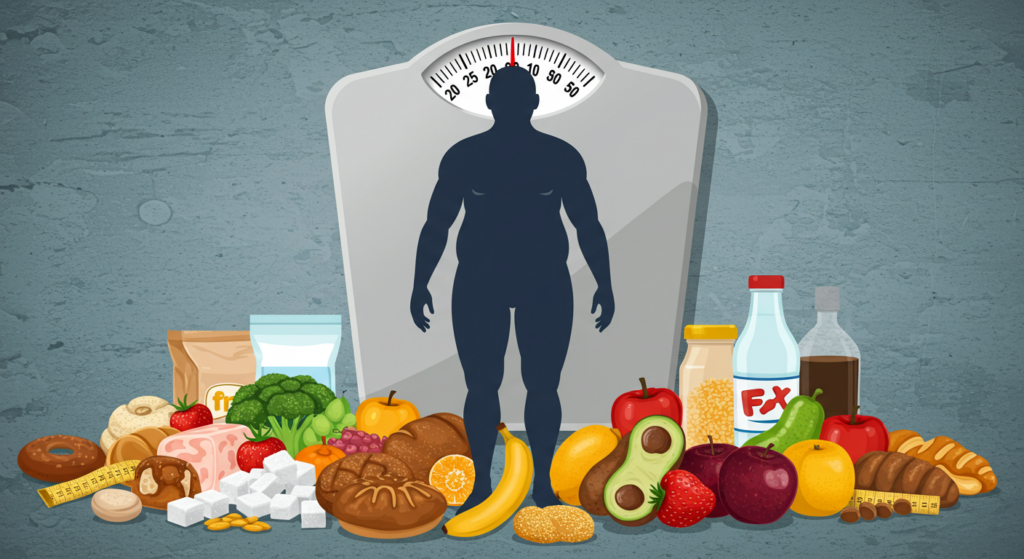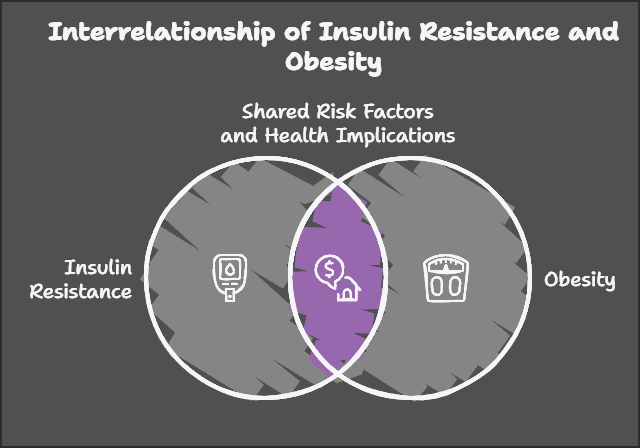The Link Between Insulin Resistance and Obesity: Are You at Risk?
About one in three Americans have insulin resistance. This fact points to a big health problem that many don’t notice. Insulin resistance and obesity go hand in hand, making a cycle that affects our health. Obesity is a big risk for insulin resistance. This can lead to diseases like type 2 diabetes and heart disease.
The link between these conditions is not simple; it involves many factors. Knowing the risk factors for insulin resistance is key. It can really change your health’s future. Understanding this connection helps us make better choices for our health.

Understanding Insulin Resistance
Insulin resistance is a silent issue. It disrupts your body’s key metabolic functions. In simple terms, it’s when cells don’t react well to insulin, a hormone that controls blood sugar. This leads the pancreas to produce more insulin. This cycle can lead to greater health problems.
What exactly is insulin resistance?
It’s a scenario where cells struggle to absorb glucose, despite the presence of insulin. This could mean needing more insulin to help your body’s cells take in glucose.
Have you ever thought about insulin’s role? It acts like a key, opening cell doors to let glucose convert into energy. If resistance increases, converting glucose becomes hard, raising blood sugar levels.
This condition often stays under the radar, with no clear symptoms. People usually find out after facing major metabolic issues or during a check-up. Older adults, inactive individuals, and overweight individuals are more at risk. Plus, extra fat can cause inflammation, making insulin resistance worse.
About 40% of U.S. adults experience insulin resistance. This shows the importance of understanding this issue. Exercise and weight loss can help fight it. These changes not only reduce resistance but also boost your overall metabolic health.
Handling insulin resistance early can help avoid diabetes and other future complications. Understanding the impact of your lifestyle on insulin can help manage risks. It’s key to maintaining better health.
What is Obesity?
Obesity is more than just about weight; it’s a significant health issue caused by too much body fat. It is defined by checking one’s Body Mass Index (BMI), where a score of 30 or more means obesity. This condition brings many health challenges and affects millions around the globe.
The obesity epidemic is alarming, with over half of U.S. adults being overweight or obese. A lack of activity and unhealthy eating are main causes. By looking into the causes of obesity, we see the impact of individual and societal factors.
- Biological factors, such as genetics and metabolism
- Environmental influences, like access to healthy foods and recreational activities
- Social determinants, encompassing educational and economic conditions
Addressing obesity means recognizing its deep roots in our society. It’s essential to tackle these elements to lower obesity rates and related health issues.

Insulin Resistance and Obesity: The Connection
The link between obesity and insulin resistance involves a complex interaction. Here, visceral fat plays a key role. This type of deep belly fat does more than add weight; it actively participates in the body’s hormone processes. This creates a strong link between obesity and insulin resistance.
The Role of Visceral Fat
Visceral fat is a key player in insulin resistance. It goes beyond a simple cosmetic concern. This fat releases inflammatory markers that mess up insulin’s normal signals.
Having too much visceral fat can hinder how your body transports and uses glucose. Studies show that this can make insulin less effective. This negatively affects blood sugar control.
Inflammation and Insulin Sensitivity
Inflammation impacts your metabolism significantly. People with obesity often face chronic, low-level inflammation. This weakens insulin sensitivity.
Visceral fat releases certain chemicals that increase this inflammation. These chemicals can make insulin resistance worse. This problem is linked to serious health issues, including type 2 diabetes and metabolic syndrome.

Symptoms of Insulin Resistance
Insulin resistance is an important condition that might not get noticed right away. It has several warning signs that are key to finding it early. Knowing these signs can help start early treatment. This can lower the chances of getting more serious conditions like type 2 diabetes.
People may feel very fatigued, as if they’re just too tired from a busy day. They might also feel hungrier than usual which makes them want to snack more. Gaining weight and higher blood pressure are often noticed together. These signs can be easy to ignore. Yet, they are important clues that something might not be right.
There are other symptoms too, like:
- Dark spots on the skin called acanthosis nigricans.
- High blood triglyceride levels.
- A waist size above 40 inches for men or 35 inches for women.
It’s crucial not to ignore these warnings. Understanding them encourages us to take action for our health early on. Knowing these signs helps us think about changing our lifestyle. We should also talk to doctors as needed. This early action might prevent type 2 diabetes and other related health problems.
Health Risks Linked to Insulin Resistance and Obesity
Understanding the health risks linked to insulin resistance plus obesity is key. These aren’t just separate issues. They’re closely linked to serious health problems that can happen if they’re not addressed.
Increased Diabetes Risk
There’s a big worry about the risk of diabetes that comes with insulin resistance. Studies show many people with type 2 diabetes are also overweight or obese. This link is troubling.
Insulin resistance can lead to high levels of glycosylated hemoglobin (HbA1c) and hyperglycemia. Without control, diabetes can get worse. It brings many health issues.

Metabolic Syndrome Overview
Metabolic syndrome is a major risk linked to insulin resistance. It includes high blood pressure, high sugar levels, too much fat around the waist, and bad cholesterol levels. These increase the risk for heart diseases, high blood pressure, and some cancers.
This condition highlights the dangers of insulin resistance. It shows why it’s crucial to manage both insulin resistance and obesity. This way, we can move towards better health.
Lifestyle Factors Contributing to Insulin Resistance
The link between our habits and insulin resistance is strong. Many folks overlook how vital what we eat is. Processed and sugary snacks are everywhere and hard to avoid. These foods lead to weight gain and play a big part in obesity.
We need to pay more attention to what’s on our plates. Eating more non-starchy vegetables, fruits, whole grains, and lean meats can help keep our blood sugar stable and improve how our bodies use insulin.
Not moving enough is also a problem. If we sit around too much, our risk of insulin resistance goes up. But, there’s a way to fight back. Any exercise can make a big difference in how sensitive our bodies are to insulin. It can counter obesity’s effects. So, whether it’s walking or a tough workout, being active is key!
Then there’s stress. It quietly affects us more than we might believe. Long-term stress changes our hormones in ways that can make insulin resistance worse. This could lead us to put on weight. Using stress-busting techniques like meditation, yoga, or just laughing can make a big difference.
Poor sleep cannot be ignored either. It messes with our metabolism and makes us crave bad food. Getting enough rest boosts our health and helps us eat better.
To improve insulin sensitivity, we can:
- Focus on eating wholesome foods.
- Stay active regularly.
- Manage stress in healthy ways.
- Make sure to get good sleep.
These steps are a strong strategy against insulin resistance and obesity.

Diagnosing Insulin Resistance
Diagnosing insulin resistance begins with a health care expert. They might suspect it by looking at symptoms and risk factors. Tests like fasting blood glucose, A1C levels, and lipid profiles are common. But, the test results can vary, needing more exams.
Monitoring blood sugar is key to finding insulin resistance. Seeing abnormal glucose responses helps. For example, waist-hip ratios signal risk. In men, above 1.0 and in women, over 0.8 mean higher risk.
Regular check-ups are vital for those at high risk. This includes anyone with obesity, high blood pressure, or diabetes in the family. Early tests help in managing health better. Adopting healthier habits, like losing weight and exercising, improves insulin sensitivity.
This might even work before seeing any weight loss. Studies show that even small weight loss can lower insulin levels in overweight people.
Knowing how to diagnose insulin resistance is powerful. It helps people make informed health choices. This can lower their chance of getting more severe conditions linked to insulin resistance.
Treatment Options for Insulin Resistance and Obesity
Fighting insulin resistance is not easy. It needs more than one solution. The first step often involves changes in how we live. Studies suggest small diet changes, like eating less salty food, can help a lot. Too much salt can lead to more glucocorticoid, which makes insulin resistance worse. Eating well and staying active can improve insulin sensitivity and help manage weight.
For some people, changing how they live might not be enough. This is where medicine comes in. For example, metformin helps control blood sugar. It has shown good results in women with polycystic ovary syndrome by improving insulin sensitivity. There are also medicines to help with weight loss, which is important because being overweight can cause insulin resistance.
Talking to health professionals is key when considering these treatments. They can offer tailored advice and keep track of how well the treatments work. Dealing with insulin resistance and obesity isn’t only about losing weight. It’s about leading a healthier life. This empowers people to better manage their health and wellness.
Source Links
- Relationship of obesity to adipose tissue insulin resistance – https://drc.bmj.com/content/8/1/e000741
- Obesity, adipogenesis and insulin resistance – https://www.elsevier.es/en-revista-endocrinologia-nutricion-english-edition–412-articulo-obesity-adipogenesis-insulin-resistance-S2173509311000110
- Metabolic signature of obesity-associated insulin resistance and type 2 diabetes – Journal of Translational Medicine – https://translational-medicine.biomedcentral.com/articles/10.1186/s12967-019-2096-8
- Insulin Resistance and Diabetes | ADA – https://diabetes.org/health-wellness/insulin-resistance
